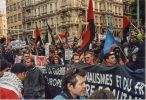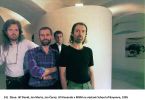The (now updated) text was distributed as the invitation for a gathering on the recent history and trends in cultural diversity in Central Europe in Olomouc NOT FOR SALE / SOLD OUT, September, 2023.
"This meeting draws on artistic and curatorial investigations into the art of the 1990s in Central and Eastern Europe seen from the perspective of the then emerging artist-run initiatives and networks outside the cultural centers and institutions. The goal of this meeting is to address the histories and potentials of such (often half-forgotten) case studies, models, strategies, networks and experiences, as well as to discuss the place of art in post-socialist societies in the period of 1989–2000. The archive of Hermit Foundation and Center for metamedia Plasy, which is in the collection of Olomouc Museum of Art, offers an example and is a step towards the outline of a broader geographical, socio-political and cultural map. It indicates how and by whom the organizers were inspired and what contacts and exchanges they established with similar centers and initiatives in the West and in the closer Central European area. see further: cead.space/Detail/occurrences/3861
Flashbacks are noisy, dangerous, painful intrusions from the past that arise from the tension between the desire to forget and the necessity of remembering.... The linearity of perception of time, which naturally erodes memory, is interrupted by the traumatic event, disturbing the integration of the past into a narrative, its assimilation into memory systems. Out of this conflict, of the body’s re-ordering of time, the past returns repeatedly and intrusively through flashbacks in the form of auditory, visual and sensory hallucinations or dreams, sometimes precise, intensely clear and lifelike accompanied by a full spectrum of sensory and emotional associations, at other times fragmented and cloudy.
Cathy Caruth: Unclaimed Experience: Trauma and the Possibility of History
The key point is that all systems (from the very largest, the universe as a whole, to the very smallest nano-systems), have three moments: their coming into existence, their “normal” life during which they are constructed and constrained by the institutions they have created, and the moment in which their secular trends move too far from equilibrium and bifurcate.
Immanuel Wallerstein
The more a modern society appears to be without alternatives, the more it will allow itself to be cynical. In the end, it is ironical about its own legitimation. "Basic values" and excuses merge imperceptibly.
Peter Sloterdijk: Critique of Cynical Reason, translated by Michael Eldred. German edition: Kritik der zynischen Vernunft, University of Minnesota Press, 1987.
I hope it is legitimate to approach those almost “historical” cultural and / or art initiatives in the proximity of the ongoing – in both academic and non-academic context – discussions, which are evolving around such buzzwords as "collective national identities", or “politics of memory”, reaching to the beginning of the United Europe around 30 year ago. Because: who is authorized and who is competent to judge and comment about our past in an authoritative way? Lets try to observe and approach those narratives from a perspective of ongoing cultural clashes, deeply intermingled with social, political, cultural or ideological turbulence and tensions of the societies in East and Central Europe (and beyond).
For at least ten years we have witnessed different Cultural Wars in the public sphere of the Czech Republic, Slovakia, Poland or Hungary for example the hot discussions, resonating in the Czech public sphere: how do we align with our “totalitarian” past i.m. normalization years between 1969 and 1989? What are the turmoils of “anti-system” protesters during the ongoing demonstrations both on streets and in the parliaments? And (on a smaller scale) how to interpret what happened during the first years of the political and economical transitions, after the return of the political plurality system, and of market economy after both the Velvet and not so “velvet” revolutions? In Poland are the conflicts and discussions evolving around similar topics, maybe tempered by the stronger position of nationalists in the government and the power of the Catholic church. But similar rhetorics are present in Hungary and Slovakia and to a certain extent in Croatia, Slovenia, Serbia, Romania or Bulgaria, not mentioning Albania, Moldavia and Baltic states.
Such controversies are sometimes violent, sometimes milder confrontations of different opinions or ideological standpoints. They are fueled by weak common sense and insecurity concerning how to "get over" the shared recent “small” histories. In fact, do we rather address here our future or our past? The waves of flashbacks haunt us with the “burning” questions as: who are we? What is our identity? How integral was my ethical intransigence as an individual and as a part of a class or a community? These flashbacks disturb us, wake up our bad consciousness, our suppressed, or even rejected memories. Deeds we would prefer to forget.
Flashbacks can even influence our mode of perception, can induce an altered, trance-like mindsets, and dissolve our sense of reality. If we don't know how to handle them, they infest our volition. get suspended and we are becoming vulnerable and more easily exposed for emotional chantage from the extreme political currents.
The main task and time-span of the Olomouc rather informal gathering was to reflect several topics of marginal histories, culture and durability in the framework of artists' private archives which survived from the years between 1989 and 2000. The exhibition Hermit Flashback served as a model of a small-scale assemblage of “historical” documents, derived from a particular initiative, which almost entirely disappeared 25 years ago. Nevertheless in memory and in documentation its aura survived, even if by "a chance”.
The state of vulnerability / fragility / temporariness is not necessarily endemic for the situation of a “transformation period” of the 90s and for the situation of former East Block countries. Let's presume it is symptomatic of the times of shifting from the ancient regime to the new one.
It would be less interesting to discuss the role of art in the post-socialist societies in 1989–2000 without mentioning the current situation of Europe of 2024 / 25. How has the geopolitical setting of Central Europe in the course of the last 30 years changed and what are the tendencies? Are we not following the path towards new physical and virtual curtains, rising from the ruins and remnants of the communication breakdowns and negligence of our own history? When we compare the situation of the Czech Republic, Slovakia, Hungary, Poland or even Austria today, it appears that those “cosmopolitan” liberals who in the first years of 1990s were successful to win with communists, national conservatives and populists, are retreating or morphing into something else. And those who were defeated are coming back to “take revenge”. Often the new populist are searching alliance with actors of anti-liberal turn, populistic, neo-nationalistic, neo-fascist or neoliberal conservative power.
Victor Orbán famously stated back in 2017: ‘In 1989 we saw our future in Europe. Now we are the future of Europe.’ And it sounds almost like a sign of a clairvoyant prophet.
The political scientist Ivan Jotov Krastev in his article The Unraveling of The PosT-1989 order express his fears that "The establishment of illiberal regimes in Hungary and Poland—complete with media controls, hostility to NGOs, disrespect for judicial independence, and intense polarization—has many fearing that Central and Eastern Europe is sleepwalking its way back to the 1930s." (1)
The wave of neo-nationalism / ultra-conservatism or neofascism in Central Europe does not seem to be a product of the reverberation of the not mature "post-communist" societies, or the clash between the totalitarian past and the fully democratic future. It is rather an integral structure and parcel of the pan-European, maybe even global “anti-globalist” movement, the ongoing battle for the identity of our western society. When the machine of market economy and the tools of liberal democracy in Central Europe during the 1990s was established, the fragile balance between cosmopolitan-liberal and national-conservative camp lost its raison d’être. Where to search the entrance to the “promised land”, when and how to replace the colonialistic utopia of the “Global West” with the "Real" East-West-South-North Union of equal rights and benefits for everybody?
Miloš Vojtěchovský
Prague, September / November 2023
The specter haunting europe the unraveling of the post-1989 order






